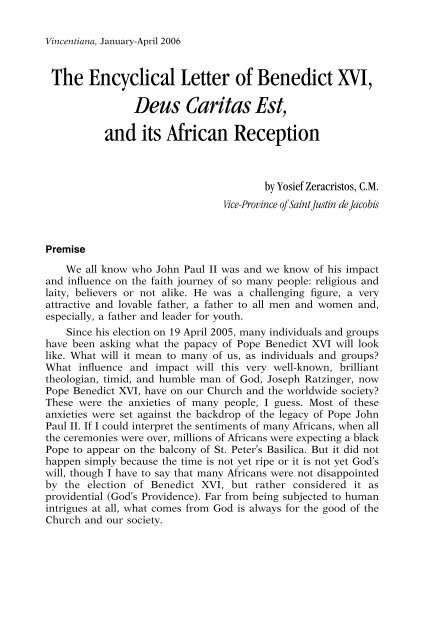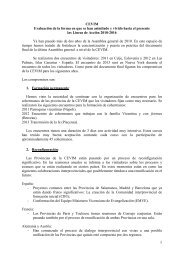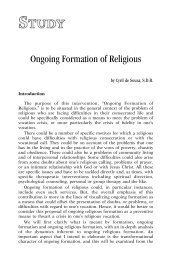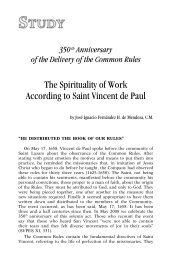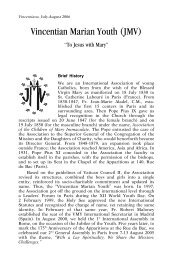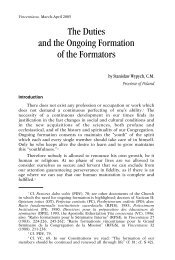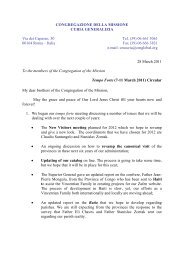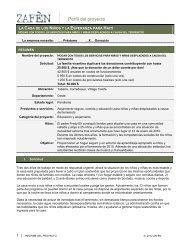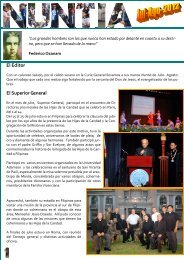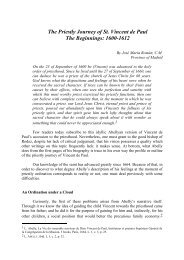The Encyclical Letter of Benedict XVI, Deus Caritas Est ... - CMGlobal
The Encyclical Letter of Benedict XVI, Deus Caritas Est ... - CMGlobal
The Encyclical Letter of Benedict XVI, Deus Caritas Est ... - CMGlobal
- No tags were found...
You also want an ePaper? Increase the reach of your titles
YUMPU automatically turns print PDFs into web optimized ePapers that Google loves.
VINCENTIANA 1/2-2006 - INGLESE<br />
July 11, 2006 − 1ª BOZZA<br />
Vincentiana, January-April 2006<br />
<strong>The</strong> <strong>Encyclical</strong> <strong>Letter</strong> <strong>of</strong> <strong>Benedict</strong> <strong>XVI</strong>,<br />
<strong>Deus</strong> <strong>Caritas</strong> <strong>Est</strong>,<br />
and its African Reception<br />
by Yosief Zeracristos, C.M.<br />
Vice-Province <strong>of</strong> Saint Justin de Jacobis<br />
Premise<br />
We all know who John Paul II was and we know <strong>of</strong> his impact<br />
and influence on the faith journey <strong>of</strong> so many people: religious and<br />
laity, believers or not alike. He was a challenging figure, a very<br />
attractive and lovable father, a father to all men and women and,<br />
especially, a father and leader for youth.<br />
Since his election on 19 April 2005, many individuals and groups<br />
have been asking what the papacy <strong>of</strong> Pope <strong>Benedict</strong> <strong>XVI</strong> will look<br />
like. What will it mean to many <strong>of</strong> us, as individuals and groups<br />
What influence and impact will this very well-known, brilliant<br />
theologian, timid, and humble man <strong>of</strong> God, Joseph Ratzinger, now<br />
Pope <strong>Benedict</strong> <strong>XVI</strong>, have on our Church and the worldwide society<br />
<strong>The</strong>se were the anxieties <strong>of</strong> many people, I guess. Most <strong>of</strong> these<br />
anxieties were set against the backdrop <strong>of</strong> the legacy <strong>of</strong> Pope John<br />
Paul II. If I could interpret the sentiments <strong>of</strong> many Africans, when all<br />
the ceremonies were over, millions <strong>of</strong> Africans were expecting a black<br />
Pope to appear on the balcony <strong>of</strong> St. Peter’s Basilica. But it did not<br />
happen simply because the time is not yet ripe or it is not yet God’s<br />
will, though I have to say that many Africans were not disappointed<br />
by the election <strong>of</strong> <strong>Benedict</strong> <strong>XVI</strong>, but rather considered it as<br />
providential (God’s Providence). Far from being subjected to human<br />
intrigues at all, what comes from God is always for the good <strong>of</strong> the<br />
Church and our society.
VINCENTIANA 1/2-2006 - INGLESE<br />
July 11, 2006 − 1ª BOZZA<br />
<strong>The</strong> <strong>Encyclical</strong> <strong>Letter</strong> <strong>of</strong> <strong>Benedict</strong> <strong>XVI</strong>, <strong>Deus</strong> <strong>Caritas</strong> <strong>Est</strong><br />
61<br />
I. African hopes and expectations from the Papacy<br />
<strong>of</strong> <strong>Benedict</strong> <strong>XVI</strong> 1<br />
What are the expectations <strong>of</strong> us Africans from the papacy <strong>of</strong><br />
<strong>Benedict</strong> <strong>XVI</strong> And what does the first <strong>Encyclical</strong> <strong>Letter</strong> <strong>of</strong> <strong>Benedict</strong><br />
<strong>XVI</strong> have to do with our hopes and expectations How is this clear,<br />
simple and theologically pr<strong>of</strong>ound <strong>Encyclical</strong> <strong>Letter</strong> understood<br />
First <strong>of</strong> all, let me clarify that the real concern or challenge is not<br />
what the papacy <strong>of</strong> <strong>Benedict</strong> <strong>XVI</strong> will do for our continent, it is<br />
rather how the leadership <strong>of</strong> the Catholic Church in Africa can<br />
re-position itself so as to create the necessary conditions for a<br />
paradigm shift on all fronts in Africa. We all remember that when<br />
John Paul II came to the See <strong>of</strong> St. Peter, Rome symbolically brought<br />
down the Berlin Wall. After so many years <strong>of</strong> conflict and<br />
divisiveness, communism and the extreme apartheid, thanks to God,<br />
came to an end.<br />
Standard Africans and good Christians dream, even with open<br />
eyes, <strong>of</strong> seeing the following curses eradicated from this beloved<br />
continent: man-made poverty caused principally by situations <strong>of</strong> war,<br />
the partial or total dependence on others (or the problem <strong>of</strong><br />
self-reliance), dictatorship, corruption, traditional debt, tribal<br />
conflicts, disrespect for human life and sexual discrimination<br />
(especially against women), etc. Africa needs to inculturate Christian<br />
values in order to transform her own. To do so, it needs the strong<br />
moral voices <strong>of</strong> her own sons and daughters joined to that <strong>of</strong> the new<br />
Pope <strong>Benedict</strong> <strong>XVI</strong>.<br />
On the other hand, the Church <strong>of</strong> Africa needs a strong,<br />
provocative moral voice, inspiration and support from the new Pope<br />
in order to: strengthen and inculturate properly her faith in Christ;<br />
modify the African culture through the person <strong>of</strong> Christ; and have a<br />
well-formed clergy with very solid moral behaviour and life-witness.<br />
What our Church needs is, I think, to have a clear conscience and a<br />
radical acceptance <strong>of</strong> Christ and his teaching. In many cases we can<br />
see that it is not the Christian faith that guides our moral behaviour<br />
but the tradition and customs <strong>of</strong> our ancestors. <strong>The</strong>refore, the<br />
Church <strong>of</strong> Africa and especially her clergy need to define clearly their<br />
vocation and Christian identity and their lifestyle as Christians.<br />
1<br />
Though I myself am an African, it is hard to speak for all Africans.<br />
After all, Africa is neither a village, nor a country, but a very huge continent<br />
with a variety <strong>of</strong> hopes and expectations. <strong>The</strong>refore, the reader <strong>of</strong> this article<br />
should be aware <strong>of</strong> this limitation. I am an Eritrean Vincentian and, in<br />
speaking about my fellow Africans, I do not have any pretension, but I simply<br />
put my personal thoughts here and not as a representative <strong>of</strong> many fellow<br />
Africans.
VINCENTIANA 1/2-2006 - INGLESE<br />
July 18, 2006 − 1ª BOZZA<br />
62 Y. Zeracristos<br />
Radical fellowship with Jesus, hence, is necessary for the Church <strong>of</strong><br />
Africa, without any shadows in regard to the life <strong>of</strong> faith, celibacy or<br />
tribalism (a very narrow and very limited way <strong>of</strong> seeing things). <strong>The</strong><br />
African Church and its clergy need to struggle against these<br />
limitations, trying to overcome them, with the help <strong>of</strong> God, and the<br />
support voiced by the vicar <strong>of</strong> Christ, <strong>Benedict</strong> <strong>XVI</strong>.<br />
II.<br />
Does <strong>Deus</strong> <strong>Caritas</strong> <strong>Est</strong> respond to the expectations<br />
and challenges <strong>of</strong> the Church in Africa<br />
Pope <strong>Benedict</strong> <strong>XVI</strong> seeks to remind us that God is Love, as John<br />
the Evangelist did. John presents God as Love to a world <strong>of</strong> conflicts;<br />
so too does the Holy Father. <strong>The</strong>refore I would say that the Pope has<br />
chosen a significant title at the heart <strong>of</strong> our Christian faith: God is<br />
Love. He believes that the strongest revolution is to believe in the<br />
Love-Power <strong>of</strong> God, as the apostles did. If we believe in Love, then,<br />
yes, it is already an answer to our questions and we definitely can<br />
meet our challenges. As a result, I personally have a sharp impression<br />
that this <strong>Encyclical</strong> <strong>Letter</strong> is a perfect response to all our<br />
expectations. <strong>The</strong> second part <strong>of</strong> this <strong>Encyclical</strong> <strong>Letter</strong> deals with<br />
effective love. It is a reminder and a clear indication <strong>of</strong> the path<br />
that the worldwide Catholic Church should take. “God is Love,”<br />
the Church is God’s family and is, therefore, communion in love.<br />
St Augustine put it clearly: “If you see charity, you see the Trinity”<br />
(cf., DCE, 19). Love and charity to all, as in the parable <strong>of</strong> the Good<br />
Samaritan, says the Pope, but also to our brothers in faith (Gal 6:10).<br />
Every individual member <strong>of</strong> the faithful and the entire ecclesial<br />
community at every level have the responsibility to love their<br />
neighbour. In the footsteps <strong>of</strong> St. Vincent, the Holy Father, affirms<br />
that love needs to be organized if it is to be an ordered service to the<br />
community. <strong>The</strong> Pope rightly reminds us, that the very nature <strong>of</strong> the<br />
Church is in her being koinonia, kerygma/liturgia and diakonia.<br />
<strong>The</strong> Church is God’s family in the world. In this family no one<br />
ought to go without the necessities <strong>of</strong> life. Yet at the same time<br />
caritas-agape extends beyond the frontiers <strong>of</strong> the Church. <strong>The</strong><br />
parable <strong>of</strong> the Good Samaritan remains as a standard which<br />
imposes universal love towards the needy whom we encounter<br />
“by chance” (cf. Lk 10:31), whoever they may be... (DCE, 25).<br />
This <strong>Encyclical</strong> <strong>Letter</strong> encourages us, as it does the Universal<br />
Catholic Church, to be committed to the work <strong>of</strong> justice:<br />
… commitment to the just ordering <strong>of</strong> the State and society on<br />
the one hand, and organized charitable activity on the other.<br />
We have seen that the formation <strong>of</strong> just structures is not
VINCENTIANA 1/2-2006 - INGLESE<br />
July 18, 2006 − 1ª BOZZA<br />
<strong>The</strong> <strong>Encyclical</strong> <strong>Letter</strong> <strong>of</strong> <strong>Benedict</strong> <strong>XVI</strong>, <strong>Deus</strong> <strong>Caritas</strong> <strong>Est</strong><br />
63<br />
directly the duty <strong>of</strong> the Church, but belongs to the world <strong>of</strong><br />
politics, the sphere <strong>of</strong> the autonomous use <strong>of</strong> reason. <strong>The</strong><br />
Church has an indirect duty here, in that she is called to<br />
contribute to the purification <strong>of</strong> reason and to the reawakening<br />
<strong>of</strong> those moral forces without which just structures are neither<br />
established nor prove effective in the long run (DCE, 29).<br />
<strong>The</strong> Pope warns that Christian charitable activity must be<br />
independent <strong>of</strong> parties and ideologies. <strong>The</strong> second part <strong>of</strong> the<br />
<strong>Encyclical</strong> <strong>Letter</strong> deals with different aspects that I consider<br />
challenges to the way we handle charitable works. It is obviously not<br />
addressed particularly or directly to the African Church, but, perhaps<br />
much more than any other Church, challenges us indeed. For the<br />
Holy Father, true love, based on Paul’s Hymn <strong>of</strong> Charity/Love in<br />
1 Corinthians 13, which he himself considers a synthesis <strong>of</strong> his<br />
<strong>Encyclical</strong> <strong>Letter</strong>, transforms individuals and society alike. If Africans<br />
believe in God who is Love and act properly, there will be no more:<br />
− poverty caused by situations <strong>of</strong> war, unjust social order<br />
and disrespect <strong>of</strong> life;<br />
− abuses or misuses <strong>of</strong> authority or dictatorship, the real<br />
disease <strong>of</strong> so many African nations, the leaders <strong>of</strong> which<br />
are blind for power and money;<br />
− corruption, poor self-love (amor propre);<br />
− tribal conflicts and discrimination;<br />
− sexual abuse or discrimination, especially against women,<br />
and so many other issues.<br />
<strong>Deus</strong> <strong>Caritas</strong> <strong>Est</strong> is also a challenge to the Church <strong>of</strong> Africa to be:<br />
− transparent and efficient: <strong>The</strong> Pope strongly appealed for<br />
transparency and efficiency in charitable activities. He<br />
reminded us to serve the poor faithfully, as Vincent would<br />
have said to us today, as Vincentian Family;<br />
− moved by Christian love and service to challenge paganism:<br />
<strong>The</strong> Holy Father mentions Julian the Apostate to tell us a<br />
very simple truth: true Christian love and service are<br />
always challenges to the secular or pagan world and are<br />
the best means <strong>of</strong> evangelization. <strong>The</strong> African Church, as<br />
the Universal one, is called to maintain a balance between<br />
activism and discouragement in face <strong>of</strong> the difficult task to<br />
accomplish, and the life <strong>of</strong> prayer. <strong>The</strong> very important<br />
message <strong>of</strong> the Holy Father seems to say: Beloved faithful<br />
and clergy <strong>of</strong> Africa, remain in love, for love and service <strong>of</strong><br />
Christ are your true vocation!
VINCENTIANA 1/2-2006 - INGLESE<br />
July 18, 2006 − 1ª BOZZA<br />
64 Y. Zeracristos<br />
Everybody knows how our Africa is filled with immense<br />
problems to the extent that it is not easy to list them all. But the Pope<br />
gives a key to our challenges: Love. “<strong>The</strong> Love <strong>of</strong> Christ urges us on”<br />
(2 Cor 5:14). We all know that love never fails. <strong>The</strong>refore, as the Pope<br />
tell us, we need to believe seriously and be in touch always with the<br />
Loving God and pray fervently as Mary the Mother <strong>of</strong> God did.


